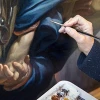20 careers found.
Anthropologists study the origin, development and functioning of human societies and cultures, as they exist now or have existed throughout history. Anthropologists are concerned with the complexities of social and cultural life, including religion, rituals, family and kinship systems, languages, art, music, symbolism and economic and political systems.
Archaeologists study past human societies by recovering, recording, analysing and interpreting material remains and other important evidence, such as cultural artefacts, food remains, skeletal remains, environmental evidence and landscapes.
Archivists analyse and document records. They also plan and perform procedures for the safekeeping of records and historically valuable documents. This may include working closely with written records, files, maps, plans, letters, books, certificates, diaries and registers. Records also include other media such as photographs, films, sound recordings, microfilms and electronic or computer records.
Conservators plan, organise and undertake the preservation and conservation of materials and objects in private, public and community collections, including libraries, archives, museums, art galleries, art centres, and historical and archaeological sites. Conservators specialise in a range of areas, including paper, paintings, photographs, social and cultural artefacts, bookbinding and archives, furniture, archaeological materials, buildings and historic sites, outdoor sculpture and large technology objects, textiles and preventative conservation.
Copywriters interpret how a potential market will react to an advertising proposal, and write material to advertise products or services. With experience, and sometimes further training, copywriters may become creative directors in advertising agencies where they supervise the work of staff in the design area, or advertising managers in retail or manufacturing firms.
Editors read and correct written material for publication, draft and implement editorial policy, decide on the content of publications or news items and manage the production of publications and the staff involved, depending on the position they hold.
Historians conduct research into past human activity, including the history of countries, organisations, periods of time, buildings, cultural heritage, particular events, people, and ideas or issues.
Journalists write and edit news reports, commentaries, feature articles and blogs for newspapers, magazines, radio, television and websites, including online publications. Journalists usually start as cadets and report routine events. In newspapers and on radio and television, most reporters are expected to be 'generalists' who are able to cover almost any topic of interest. With experience, and sometimes further training, journalists may perform a variety of tasks according to their area of specialisation.
Librarians design, develop and manage physical and online collections in order to deliver innovative services to users. Library collections can include books and e-books, magazines, images, music and video, maps, newspapers, computer games and other digital resources.In large libraries, librarians may specialise in areas such as acquisition, research, cataloguing, online services or children's services. They may also work in specialist libraries, including corporate, legal, medical or school libraries, or independently as researchers or knowledge managers.
Library technicians assist librarians and other information managers to organise and control library and information systems. They are involved in all facets of library functions, including circulation, acquisitions and reference work. They usually work under the supervision of librarians, but may also supervise other staff.
Museum curators look after, manage, organise, display and develop museum collections, and conduct related research. Museum curators usually specialise in a broad discipline, such as anthropology, art, decorative arts, natural history, social history, science or technology. Within that discipline they are generally recognised as authorities on one or more specific subject areas.
Museum officers prepare specimens for collections, and construct and arrange museum and art gallery exhibits.
Project and program administrators plan and administer programs, special projects and support services, including management or staff. Project and program administrators can work for either public or private sector organisations. They are responsible for ensuring that projects such as major building and construction or information technology infrastructure, or programs such as new government policies, are designed and completed on time and within budget.
Project support officers assist and support project managers, specialists and other workers with the planning and ongoing administration of programs and projects.
Research and development managers plan, administer and review the research and development program and activities of an organisation.





